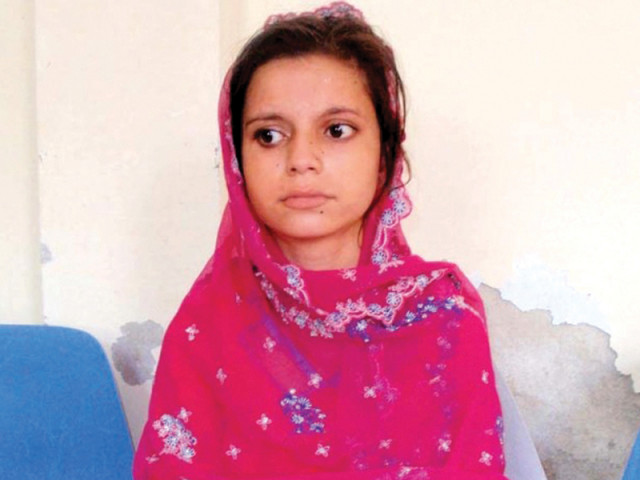Child Marriages Law: Lawmakers differ on going easy or being tough
PPP’s Rubina Qaimkhani, Sharmila Farooqi finalise drafts with gaping differences.

Nadia, 11, was bartered her off in ‘marriage’ to a boy almost twice her age in Sukkur in 2011. The Sindh government is gearing up to reform the Child Marriages Law by imposing heftier fines and stricter punishment on offenders. PHOTO: FILE
As the Sindh government gears up to reform the Child Marriages Law, differences have surfaced between the ruling party’s female legislators who have taken the task of drafting the bill - one draft has been prepared by provincial minister Rubina Saadat Qaimkhani and the other by MPA Sharmila Farooqi.
Both of them are also part of an eight-member committee of the MPAs who were tasked on August 1 with preparing drafts in consultation with the stakeholders. The subjects for the legislation cover child marriages, honour killings, harassment of women and acid attacks.

Besides the stated lack of coordination, the two preliminary versions of the proposed law differ largely in terms of punishment and classification of the offence.
The concurrence is limited to the age limit for the marriage which has been set at 18 years for both males and females. Anyone under the age of 18 years is described as a child or a minor.
Friction
Farooqi submitted her version, titled Child Marriages Prohibition Act, 2013, of the draft in the Sindh Assembly on August 20 but Qaimkhani said that she was not aware of this. According to Farooqi, Qaimkhani was made convener of the eight-member committee but she never called a meeting of the MPAs. “As a member [of the committee] I had to work on the law and submit proposals.”
She claimed that her fellow MPA adopted the draft prepared by a non-governmental organisation while her version is based on personal consultation with the stakeholders. “Why is there a need to table another bill when one can debate and make changes in the assembly to my draft?” Farooqi asked.
Qaimkhani, whose draft has been scrutinised by the law and women development ministries, says she has re-drafted the bill tabled in 2011 by former women development minister, Tauqir Fatima Bhutto. “My bill, titled The Child Marriages Eradication Act, will be the one tabled from the ministry. Sharmila might have submitted it as a private bill,” she told The Express Tribune, adding that she will take it to the floor for debate in the assembly’s upcoming session.
Penalty and punishment
Both drafts describe offenders as any adult of over 18 years who contracts marriage with a minor and the facilitators include parents and all those who have a part in solemnising a marriage. But both the proposed legislations have gaping differences over the term of imprisonment and amount of penalty for the convicted offenders.
Farooqi has recommended seven-year jail term or Rs500,000 fine or both while Qaimkhani appear more lenient and has limited the incarceration to just two years and fine to Rs100,000. “The aim is not to punish but to deter people,” explains Justice (R) Shaiq Usmani who prepared the draft for an NGO, HANDS, and handed it over to Tauqir Fatima Bhutto in 2011. In that version the punishment was kept to just one year in prison.
“Early marriages are ubiquitous in rural communities. There will be a backlash if we start putting people in prison for so long for doing what they believe is a religious and social obligation,” Usmani contended.
In contrast, Farooqi asserts that her suggested punishment will scare people away from marrying their children at an early age, saying, “We hear stories about people selling their daughters. The heavy fine will also act as a barrier against the practice.”
Currently, the enforced Child Marriage Restraint Act, 1929 awards three-month maximum imprisonment and Rs1,000 fine.
Classification of offence
The Child Marriages Prohibition Act classifies the offence as cognizable, non-bailable and non-compoundable. The Child Marriages Eradication Act, however, holds it only as a cognizable offence. “Again, the objective is not to make the punishment severe,” justifies Usmani.
For Dr Arfana Mallah, a women rights activist and leader of the university teachers’ association, non-bailable and non-compoundable terms are necessary to make the law effective. “It’s the state which should be a defender of the children’s rights. So, in every case pertaining to child marriages, the state should be a complainant and not the common people,” she said, but clarified that in regard of punishment, she supported Qaimkhani’s draft.
Qaimkhani’s draft is time-barred as a complainant has to file a case within a year of solemnization of a marriage. Farooqi’s, on the other hand, does not put a time limit - her law will have a retrospective effect if it is enacted as it allows for rescinding a marriage, which took place before passage of the law. It provides for doing away with the marriage without filing for divorce.
The proposed law even goes on to provide legitimacy to a child ‘born or conceived’ from such a marriage and ensures the financial support as well.
Court’s jurisdiction
Similarly, the two drafts also differ on the jurisdiction of the court. The prohibition act extends the jurisdiction to the district and sessions court but the eradication act makes family court the primary one for such proceedings.
“We have held extensive consultations for several years with the cross section of rural communities, religious clerics and the civil society before making these recommendations,” said Bilqees Rehman, the general manager of HANDS. “We have conceived it as a law which simultaneously works for awareness, deterrence and punishment and not just punishment for the sake of offence.”
Published in The Express Tribune, September 14th, 2013.



















COMMENTS
Comments are moderated and generally will be posted if they are on-topic and not abusive.
For more information, please see our Comments FAQ